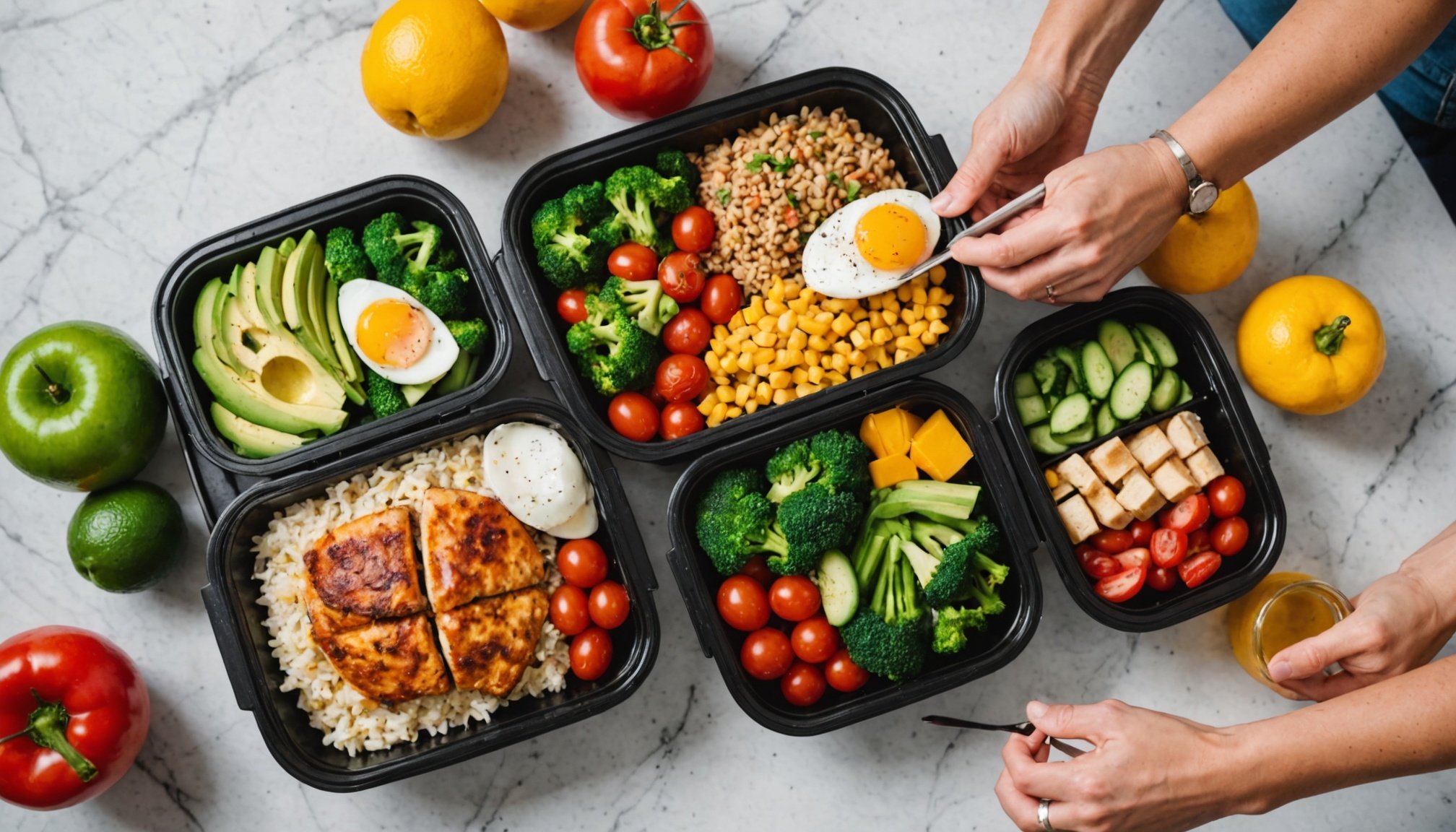Understanding Meal Prep for Busy Families
Meal prep can be a game-changer for busy UK parents. By mastering a few meal prep basics, families can enjoy more nutritious meals while also improving time management, making life smoother for everyone involved. The core principle of meal prep is to plan and prepare meals in advance, often for the week, to ensure that healthy, home-cooked meals are always accessible.
Family meals are not only about sustenance but also about quality time and bonding. When families engage in meal prep together, they incorporate teamwork and share responsibilities, which strengthens their ties and promotes healthier eating habits. Through effective time management, parents can save precious hours during hectic weeks, reducing the need for last-minute takeaway orders.
Additional reading : Unlocking Optimal Gut Health: Top Fermented Food Strategies for UK Residents
Of course, meal prepping does come with its own set of challenges. Many working parents find it difficult to set aside the initial time required for planning and cooking. However, by breaking down meal prep into manageable tasks, such as shopping, prepping ingredients, and cooking in batches, these hurdles can be significantly reduced. Ultimately, the benefits—such as stress reduction and improved health—far outweigh these challenges, making meal prep a valuable tool for busy families.
Essential Meal Prep Techniques
In the realm of meal prep techniques, achieving efficiency in the kitchen is a game-changer.
Additional reading : Unlocking Wellness: Exploring the Lasting Health Advantages of the Mediterranean Diet for UK Residents
Batch Cooking
Batch cooking is a valuable strategy for those seeking efficiency. By preparing large quantities of food at once, you save time throughout the week. This method not only cuts down on daily cooking stress but also ensures nutritious meals are always ready.
Freezing and Storing
After batch cooking, proper freezing and storing techniques become vital. Use airtight containers and label them with dates for easy tracking. Consider dividing meals into single portions for easy access. Ensuring optimal freezer temperatures is key to maintaining food quality.
One-Pot and Sheet Pan Meals
One-pot meals and sheet pan meals are the epitome of simplicity, yet nutritious. These methods minimize cleanup, reducing kitchen time significantly. You can create a variety of dishes like the classic lasagna soup (one-pot) or roasted vegetables with chicken (sheet pan). Their simplicity makes them perfect for busy families yearning for hearty meals.
Embracing these meal prep techniques enhances efficiency in the kitchen, saving both time and effort, while ensuring that nutritious dishes are always within reach.
Time-Saving Recipes
Quick recipes are an indispensable ally in today’s fast-paced world. Whether catering to bustling mornings or rushing through evening meal preparations, having a repertoire of these family-friendly meals can make all the difference. When combined with healthy options, they ensure a balanced diet for everyone.
Breakfast Ideas
Morning routines are often frantic, making quick recipes essential. Opt for overnight oats or yogurt parfaits for an easy-to-prepare breakfast. These options require minimal effort while providing essential nutrients. Adding toppings like fruits or nuts can enhance their appeal.
Lunch Options
Packing healthy lunches that kids will love can be challenging, but quick recipes can make it easier. Sandwich pinwheels or wraps incorporate various healthy ingredients. Using whole-grain wraps and fresh vegetables ensures a balanced meal while keeping it exciting for kids.
Dinner Solutions
For dinner, quick recipes are perfect for busy evenings. Dishes like stir-fries or sheet-pan meals involve minimal prep time. These can be customized with different proteins and vegetables, providing variety and nutrition. Embracing such solutions helps maintain a healthy lifestyle despite time constraints.
Weekly Meal Plan Template
Designing a meal plan that caters to the nuances of a UK family requires attention to detail, but the benefits of structured eating are immense. A sample meal plan should not only provide nutritional balance, but also incorporate elements of flexibility. This ensures it remains realistic and accommodating for families’ diverse needs.
When crafting a weekly menu, consider the availability of seasonal ingredients. Seasonal produce not only enhances the taste of your meals but often comes at a more affordable price. For example, in autumn, root vegetables can become a central feature, offering warmth and comfort to your dinners.
Adjusting the plan according to family preferences is also crucial. Engaging every family member in discussions about their meal tastes can make the dining experience more enjoyable. Perhaps one night could feature the favourite meal of each family member, fostering more inclusive planning.
Here’s a simple strategy to aid your meal planning journey:
- Begin by noting down the core meals your family enjoys.
- Introduce new recipes gradually, alongside familiar favourites.
- Reserve a day for leftovers or a ‘cook’s choice’ to allow for spontaneity.
Being mindful of these aspects can transform a meal plan into a consistent and adaptable solution for healthy and enjoyable eating.
Shopping Lists for Meal Prep
Thinking of someone in need of grocery shopping advice brings to mind the benefits of an organized shopping regime, especially tailored for meal prep ingredients.
Creating a Comprehensive Shopping List
An efficient and thorough shopping list is crucial. Begin by categorizing items into sections such as pantry staples, fresh produce, and proteins. This method streamlines the shopping process, ensuring nothing is overlooked. Prioritizing your list aids focus, reducing time spent wandering aisles aimlessly. It’s not just effective but it also enhances the shopping experience by bringing clarity to what’s necessary for your meal prep.
Utilizing Local UK Markets
Sourcing fresh ingredients from local UK markets presents wonderful opportunities for acquiring high-quality produce. Visiting these markets not only supports the local economy but often results in fresher goods compared to supermarket selections. Exploring stalls allows for discovering unique items seasonal to the UK, and interaction with vendors can provide valuable insights into cooking tips and recipe ideas.
Budget-Friendly Tips
When aiming to stick to a budget during meal prepping, preparation is key. Allocating a specific budget for your shopping trip serves as a financial guideline. Consider comparing prices across various vendors for the best value. Additionally, purchasing seasonal fruits and vegetables minimizes costs while maximizing nutritional benefits. By keeping these strategies in mind, meal prep becomes a manageable task without financial strain.
Efficient Use of Kitchen Tools
In the pursuit of smoother and more enjoyable meal prep, selecting the right kitchen tools is crucial. Items like measuring spoons, sharp knives, and cutting boards form the backbone of any well-equipped kitchen. These essentials ensure precision and safety, making meal preparation straightforward and efficient.
Time-Saving Gadgets
Incorporating time-saving gadgets can transform your cooking experience. For instance, a food processor isn’t just a luxury; it significantly reduces chopping time, allowing you to prepare ingredients swiftly. Similarly, a slow cooker can be a game changer—set it in the morning and return home to a hot, ready meal. These gadgets not only save time but also enhance the quality and flavour of meals, making homemade dishes more attainable for busy individuals.
Optimizing Your Kitchen Space
Proper organization amplifies the effectiveness of your kitchen tools. Keep frequently used items within arm’s reach to avoid unnecessary searches. Categorizing meal prep equipment logically—for instance, group cutting tools together—simplifies the process. This organization results in a seamless workflow, helping you focus more on cooking rather than locating tools.
Investing in the right kitchen tools and organizing them efficiently ensures your meal prep is not just a task, but a truly rewarding experience.
Overcoming Common Meal Prep Challenges
Meal prepping can be a rewarding and efficient way to maintain a healthy lifestyle, but challenges in meal prep often arise.
Picky Eaters
Dealing with picky eaters is a common challenge. To address this, involve them in the selection of meals; this can spark their interest and willingness to try new dishes. Introduce a variety of flavours and textures gradually, mixing familiar favourites with new ingredients. Offering customisable meals, like tacos or pasta bars, allows personal preference while ensuring nutritional balance.
Time Constraints
Balancing a busy schedule with meal prep requires effective problem-solving techniques. Utilise weekends or free evenings for bulk cooking, storing meals in portions to save time during the workweek. Employ tools like slow cookers and ovens set with timers to prepare dishes without constant supervision. Additionally, developing a balanced meal plan in advance can streamline grocery shopping and reduce last-minute stress.
Ingredient Availability
Ingredient availability often poses a barrier. To overcome this, remain flexible with recipes, substituting similar items based on seasonal availability or sales. For instance, substitute fresh produce with frozen alternatives without sacrificing nutrition. Create a list of staple ingredients that are versatile across multiple recipes, ensuring you always have the essentials on hand.
Real-Life Meal Prep Success Stories
Meal prepping can be transformative for many families, and numerous UK parents have shared their inspiring experiences. These case studies showcase real shifts in family eating habits, providing practical tips and insights into successful meal prep.
One parent, Sarah from Manchester, shared her family’s journey. Her children were fussy eaters, and meals were a constant battle. By integrating meal prepping into her routine, she was able to save time and reduce stress significantly. She learned that involving her kids in the meal preparation process not only made them more interested in the food but also taught them valuable skills.
Another parent, David from London, used meal prep to combat unhealthy snacking. He prepped healthy snacks and meals over weekends, which improved his children’s nutritional intake and saved money. His advice to other parents is simple yet profound: “Start small, keep it simple, and gradually increase complexity as you become comfortable.”
These stories highlight not only the successful adoption of meal prep techniques but also the valuable lessons learned. Sharing these parent experiences allows others to see that change is possible and often practical implementation of meal prepping can contribute to better family health and harmony in the home.










